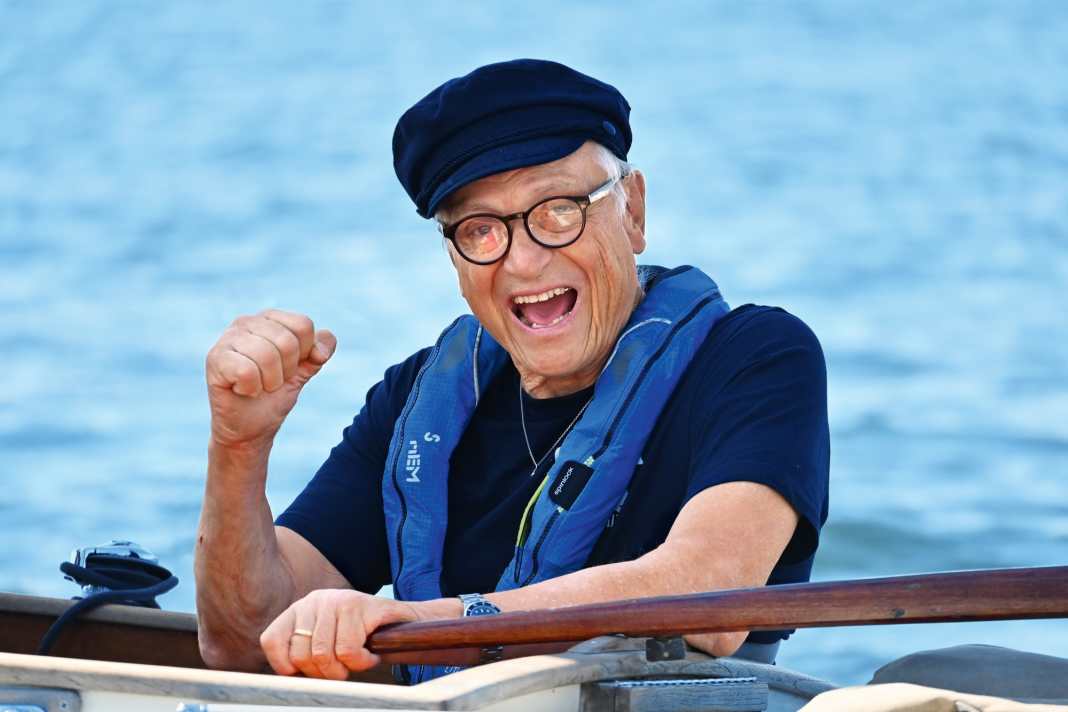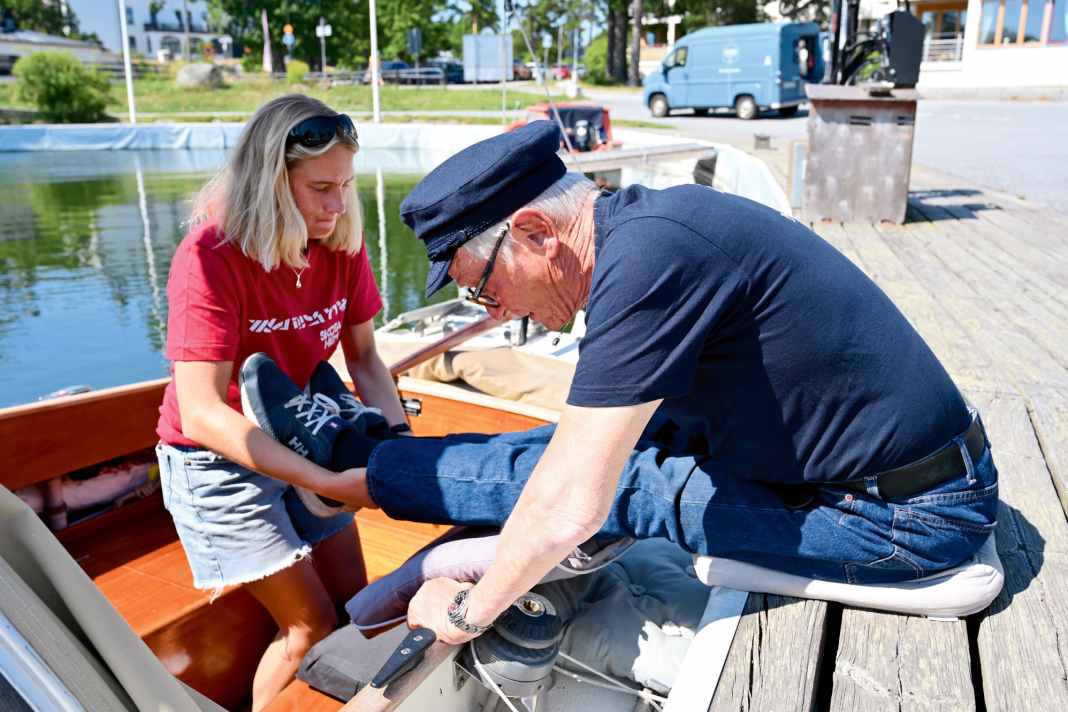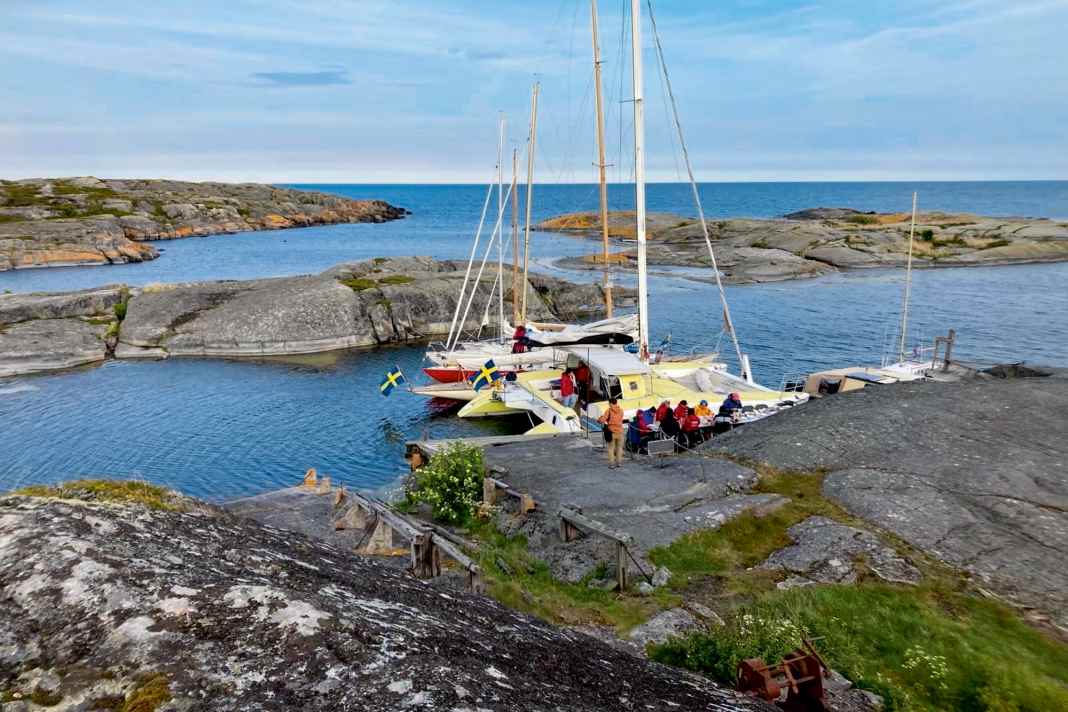Portrait: The will sets sail - How Claes Hultling is revolutionising sailing for paraplegics
Fabian Boerger
· 21.08.2025






When Claes Hultling sits at the tiller of his folk boat "Våga" and sails through the Stockholm archipelago, everything seems completely natural. The 72-year-old leans comfortably against the high coaming, his right arm resting relaxed on the edge. The water laps gently against the clinkered hull. Hultling and his folk boat are a single unit - you can tell at first glance.
This might also interest you:
The fact that their togetherness is something extraordinary only becomes clear when the "Våga" returns to the jetty at home. A wheelchair is waiting there for its skipper. Claes Hultling is paraplegic. He broke his neck 41 years ago when he jumped into shallow water. That was in May 1984, three weeks before his wedding. Since then, he has been paralysed from the chest down. Hultling can barely even move his upper body; while he can use one arm well, the other has limited mobility.
"On a normal yacht, I would be one hundred per cent disabled. That would frustrate me," says the disabled sailor, adding that it is, however, perfectly possible to customise a boat to his needs. One example of this is his "Våga". The owner describes it as a boat-turned-ideal - a veritable smorgasbord of customisations that offers everything a paraplegic needs. In addition to a fixed toilet and a hot water shower, the boat has a 12 hp diesel engine, a cooling unit, a heater and a gas cooker. This means that the boat, which is over seven metres long, is in no way inferior to a 38-foot blue water yacht.
Folkeboot by Claes Hultling is unique
The numerous refits on deck also catch the eye. There are the three electric winches to starboard, the massive bracket above the companionway, the T-shaped "Park Avenue" boom and the arm-thick jib boom on the foredeck. The fact that all halyards, sheets and outhauls are led into the cockpit are also adaptations that seem rather unusual for a classic like this. For Claes Hultling, however, they are indispensable. They even allow him to sail his boat single-handed.
In addition, grab handles are fitted everywhere and instead of a step, there is a sloping board that you can slide over to get inside. All the edges are rounded and the most important things, including his wheelchair, can be stored in the many storage boxes and cupboards. Everything is no more than an arm's length away.
The boat is unique and tailored precisely to Hultling's needs. Where other yachts would set him limits, his modified folk boat gives him freedoms that would be unthinkable without it - such as single-handed cruises in the Stockholm archipelago. He has also travelled here with his family on numerous summer trips. Or he towed the boat with a trailer to Croatia to sail on the Adriatic Sea. "Because it's simply nice and warm there in spring," he says, as if the 2,000 kilometre trip was the most natural thing in the world.
Expert in rehabilitation medicine with a passion for sailing
Hultling is characterised by his zest for action and his characteristic way of simply getting things done. Conversations are dominated by his modesty. It is honest and authentic - he overcomes obstacles without talking much about them.
"If a boat is adapted so that everything can be operated with your hands, it doesn't matter whether you can use your legs or not."
This becomes particularly clear when you look back at the time after his accident: Just two weeks after waking up from his coma, he caught up on his wedding, and a few months later the physician returned to work. Since then, he has worked full-time and is now Professor of Neurobiology at the Karolinska Institute in Stockholm, where he heads the medical department that looks after more than 1,500 patients - a quarter of all cases in Sweden.
Hultling is recognised as one of the leading experts in the field of rehabilitation medicine. He is co-founder of the Spinalis Foundation, which is committed to improving the quality of life of those affected. He has already received several awards for his commitment, including the Swedish King's Medal of Honour and Entrepreneur of the Year. All of this can be seen in the numerous television and newspaper reports about the Stockholm native. But he rarely talks about it himself. He would much rather talk about his great passion: sailing.
Hultling is a pioneer of Paralympic sailing
This was an essential part of him long before his accident. He discovered the Stockholm archipelago by boat early on. Together with friends, he looked after an old eighth built in 1927. After his accident, his requirements naturally changed and Hultling switched to the 2.4mR yachts, which were still quite new at the time. This class, co-designed by Swedish designer Peter Norlin, is considered particularly suitable for people with disabilities. The reason for this is the handling, which can be highly customised. The boats can be operated with foot pedals or a joystick. In addition, line guidance and sheets can be customised so that people with, without or with mild or severe disabilities can sail together.
Hultling travelled the world with this boat and sailed off coastal cities such as Barcelona, Dubai, Abu Dhabi and Melbourne. And while the regatta fields were still small at the end of the 1980s, this changed significantly in the following years, not least thanks to his commitment. Early on, the enthusiast campaigned for the class to become a Paralympic discipline. To this end, Hultling organised international regattas, for example, and campaigned for the so-called mini-twelve worldwide with clubs and associations.
"I worked hard and sailed a lot - two to three hours a day, 200 days a year," he said. At the turn of the millennium, his efforts were finally rewarded and sailing was officially included in the Paralympic Games programme. But Hultling was right in the thick of it, representing the Swedish national team in the 2.4mR class.
Foundation aims to familiarise people with disabilities with sailing
But Hultling didn't just throw himself into Paralympic sailing. His drive and passion found expression in another project close to his heart: in 1987, together with Pelle Gedda and Björn Wahlström, he founded the donation-funded foundation "Skota Hem", which translates as "to bring home".
Since the beginning, the small jetty has been located in Saltsjöbaden, an affluent suburb of Stockholm. Nestled between the Grand Hotel on the right and the Royal Swedish Yacht Club on the left, there are around 25 boats for inclusive sailing, including 2.4mR yachts, RS Venture and Sonar boats. Every year, up to 500 people with disabilities take to the water in these boats. The aim of the foundation is to familiarise people with disabilities with sailing and to awaken new passions and courage to face life. For many of those affected, their world collapses when they are diagnosed. They are often people who are looking for a thrill, explains Hultling. They are keen mountain bikers, motorcyclists or skiers, and with the loss of mobility, many also lose their sense of purpose in life.
He knows some people who wanted to take their own lives after such accidents. Sailing, he says, can help them get out of this slump. "When they sit downwind at 25 knots and the boat ploughs through the waves, the adrenaline shoots through their bodies again - it's fascinating."
Learning methods with which goals can be achieved
A boat can make impairments fade into the background, says Tova Ostling. The young Swede is part of "Skota Hem" and helps where barriers are sometimes difficult to overcome for paraplegic participants - for example when leaving the boat or setting and retrieving the sails. She is convinced: "If a boat is adapted so that everything can be operated with your hands, it no longer matters whether you can use your legs or not."
"Being on a boat is one thing, but actively sailing along is something else. You only need a few adjustments, everything else comes naturally."
Hultling's son Emil, who shares his father's passion for sailing and accompanies him on trips to the archipelago, takes a similar view. "When sailing with disabilities, you have to be a problem solver. But that's part of sailing; it's not always related to the impairment," he says. It is more important to recognise not only the hurdles, but also the opportunities that sailing offers.
There is another aspect to this: when sailing, those affected are confronted with challenges that they learn to overcome together with others. "It's like teaching children maths," says Claes Hultling. Instead of telling them the solutions, you have to show them the methods they can use to achieve their goals independently.
New "Lova" project leads into Stockholm's archipelago
Overcoming the barriers of sailing means regaining freedom. There are more and more programmes for people with disabilities around the world. However, some areas of sailing have so far remained closed to them - such as cruising. Hultling's latest project is to change this. He wants to make the outer reaches of the Stockholm archipelago accessible to people with disabilities. In 2023, Hultling therefore launched the "Lova" project, which means "to lull".
In changing groups, up to ten wheelchair users sail together with ten carers on different boats for several days in the Stockholm archipelago. Newcomers in particular can familiarise themselves with life on board in several stages with overnight stays. Access to toilets plays a particularly important role for many, says Hultling. This is because people without disabilities can quickly disappear behind a rock. This is not the case for wheelchair users: some of them struggle with incontinence, for others a toilet routine is simply important for their individual well-being. This is why the fleet is accompanied by a motorised boat that has both a shower and a toilet on board. "For many, this is the decisive factor," says Hultling.
Claes Hultling wants to expand commitment
One person who has been involved with Skota Hem and Lova for years is Peter Fahlström from the Stockholm Parasail Society (SPSS). "I've never met a participant who said after a "Lova" trip: 'This is not for me'." Over twenty years ago, Fahlström also suffered a neck injury in a swimming accident. Sailing has given him new courage to face life. He now wants to pass this experience on to others. "Our aim is not to convince people, but to make it accessible to as many people as possible," says Fahlström. "Being on a boat is one thing," he explains, "but actively sailing is a completely different experience. And that only requires a few adjustments to the boat," says Fahlström. "Everything else comes naturally."
If Claes Hultling has his way, the sailing projects will continue to grow. He wants to use boats that are suitable for people with disabilities not only in Stockholm. They should also be available in other Swedish cities, such as Malmö or Gothenburg, where they can be chartered by families at favourable rates. This would allow more people with disabilities to experience the Swedish archipelago from a sailing boat. Hultling: "A doctor can prescribe medication or equipment. Real rehabilitation must be achieved by the person concerned."
A folk boat that is second to none






The exact number of folkboats worldwide is unclear, but it is estimated that there are between 5,000 and 6,000 of them. However, there is probably no other folkboat quite like the "Våga". Claes Hultling bought the boat in 1992 and had it gradually rebuilt in accordance with the class rules. Today it is a conglomeration of custom-built boats, perfectly adapted to the needs of the paraplegic owner.
Lova: An archipelago for everyone




The "Lova" project has been offered annually since 2023. Several foundations, including Spinalis, Skota Hem and the Stockholm Parasail Society, support the initiative. The project is aimed at people with spinal cord injuries.
With the support of sailing instructors and medically trained counsellors, the participants sail into the remote areas of the Stockholm archipelago that are otherwise difficult to access. The aim is to make the archipelago accessible to all. The trip is divided into four different stages, which vary in the number and type of overnight stays. This allows those who are undecided to carefully feel their way around. Further information on the project can be found at: spinalis.se/segling

Fabian Boerger
Editor News & Panorama
Fabian Boerger ist an der Lübecker und Kieler Bucht zuhause – aufgewachsen in diversen Jollen und an Bord eines Folkeboots. Seit September 2024 arbeitet er als Redakteur im Panorama- und News-Ressort und verbindet dort seine Leidenschaften für das Segeln und den Journalismus. Vor seiner Zeit bei Delius Klasing studierte er Politikwissenschaften und Journalistik, arbeitete für den Norddeutschen Rundfunk und das ZDF. Sein Volontariat machte er bei der MADSACK Mediengruppe (LN, RND). Jetzt berichtet er über alle Themen, die die Segelwelt bewegen – mit dem Blick des Praktikers und der Präzision des Journalisten.

